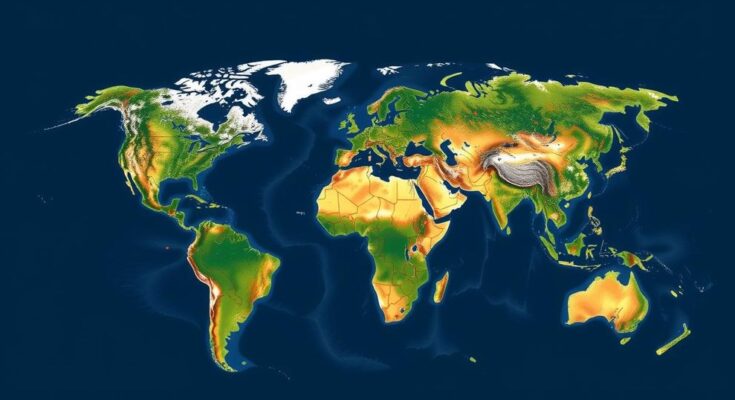A report issued by the Global Commission on the Economics of Water warns that climate change is destabilizing global water supplies, risking over half of the world’s food production by 2050. The report urges global cooperation to mitigate these challenges, highlighting the severe impact on both agriculture and economic stability, particularly for lower-income countries.
A recent report by the Global Commission on the Economics of Water (GCEW) has highlighted an alarming global water crisis driven by climate change, which jeopardizes food production on a massive scale. The report reveals that due to alterations in rainfall patterns and intensifying water mismanagement, reliance on freshwater supplies is increasingly precarious. It asserts that nearly three billion individuals and more than fifty percent of the world’s food production exist in regions anticipated to experience a decline in total water storage by the year 2050. Major agricultural sectors are under significant threat; should current trends persist, global cereal production could decrease by as much as twenty-three percent. Parts of the world that are densely populated, specifically northwestern India, northeastern China, and areas across southern and eastern Europe, are reported to be particularly vulnerable to freshwater scarcity. The increase in global temperatures has initiated a vicious cycle resulting in the loss of “green water,” defined as the moisture within soils and vegetation, contributing to half of the world’s rainfall. This situation exacerbates the already serious issues surrounding drought, biodiversity loss, and soil degradation. According to the report, the consequences of these water cycle disruptions are projected to inflict severe economic ramifications, including an estimated eight percent decline in GDP for high-income nations by 2050, and potentially a fifteen percent drop for lower-income countries. To address these escalating challenges, the GCEW emphasizes the need for extensive global cooperation regarding water resource management. Co-chair Tharman Shanmugaratnam, President of Singapore, urged the formation of common sustainability goals in water management and the establishment of a global water agreement. Furthermore, Ngozi Okonjo-Iweala, Director-General of the World Trade Organization and another co-chair, indicated the necessity of redirecting approximately six hundred billion dollars in annual agricultural subsidies towards water conservation techniques and discouraging the cultivation of water-intensive crops in inappropriate environments.
The water crisis is increasingly recognized as a critical issue driven by the effects of climate change, where altered precipitation patterns and rising temperatures adversely affect freshwater availability. As the world grapples with these challenges, it is imperative to consider the ramifications on food security, particularly given that a significant portion of the global population relies on agricultural production. The GCEW, established in 2022, was tasked with investigating these issues and proposing sustainable water management practices to mitigate the crisis.
In summary, the report from the Global Commission on the Economics of Water highlights a significant crisis that has the potential to threaten global food production and economic stability due to changing climate patterns. Immediate global cooperation and revised management approaches to water resources are necessary to address the ongoing challenges posed by water scarcity. Without effective action, the consequences may threaten not only food supply but also broader economic health, particularly in vulnerable regions.
Original Source: www.rfi.fr




